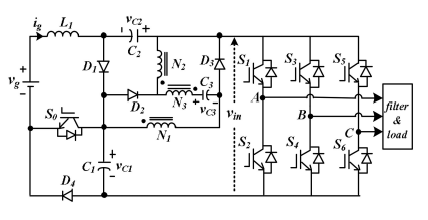Analysis and Control of Switched Quasi-Impedance-Source-Inverter with Superior Boosting Ability for Renewable Energy Applications
Objective
The main objective of this project is to improve the input current ripple with enhanced boosting ability and appropriate control of the impedance network active switch.
Abstract
In this project, a new coupled inductor-based switched quasi-ZSI is proposed to accomplish enhanced boost inversion at a high modulation index. It offers a robust boosting feature even with a very low turn’s ratio, which significantly reduces the passive circuit element’s size. The working principle, steady-state analysis, and the design guidelines for selecting circuit parameters are addressed. The proposed inverter significantly improves the input current ripple with enhanced boosting with appropriate control of the impedance-network active switch. A comprehensive comparative analysis with allied topologies is presented to show the proposed inverter’s effectiveness. The superior features offered are more suitable for renewable energy generation from low- and variable-voltage renewable sources, such as solar PV and fuel cells. The simulation results can be evaluated by using Matlab/Simulink Software.
Keywords: Enhanced boost, quasi-impedance-source inverter, renewable energy generation, shoot-through (ST), single stage, switched Z-network.
NOTE: Without the concern of our team, please don't submit to the college. This Abstract varies based on student requirements.
Block Diagram

Specifications
Software Configuration:
Operating System : Windows 7/8/10
Application Software : Matlab/Simulink
Hardware Configuration:
RAM : 8 GB
Processor : I3 / I5(Mostly prefer)
Learning Outcomes
- Introduction to Matlab/Simulink
- What is EISPACK & LINPACK
- How to start with MATLAB
- About Matlab language
- About tools & libraries
- Application of Matlab/Simulink
- About Matlab desktop
- Features of Matlab/Simulink
- Basics on Matlab/Simulink
- Introduction to controllers.
- Study of PWM techniques.
- Project Development Skills:
- Problem analyzing skills
- Problem solving skills
- Creativity and imaginary skills
- Programming skills
- Deployment
- Testing skills
- Debugging skills
- Project presentation skills
- Thesis writing skills





 Paper Publishing
Paper Publishing
